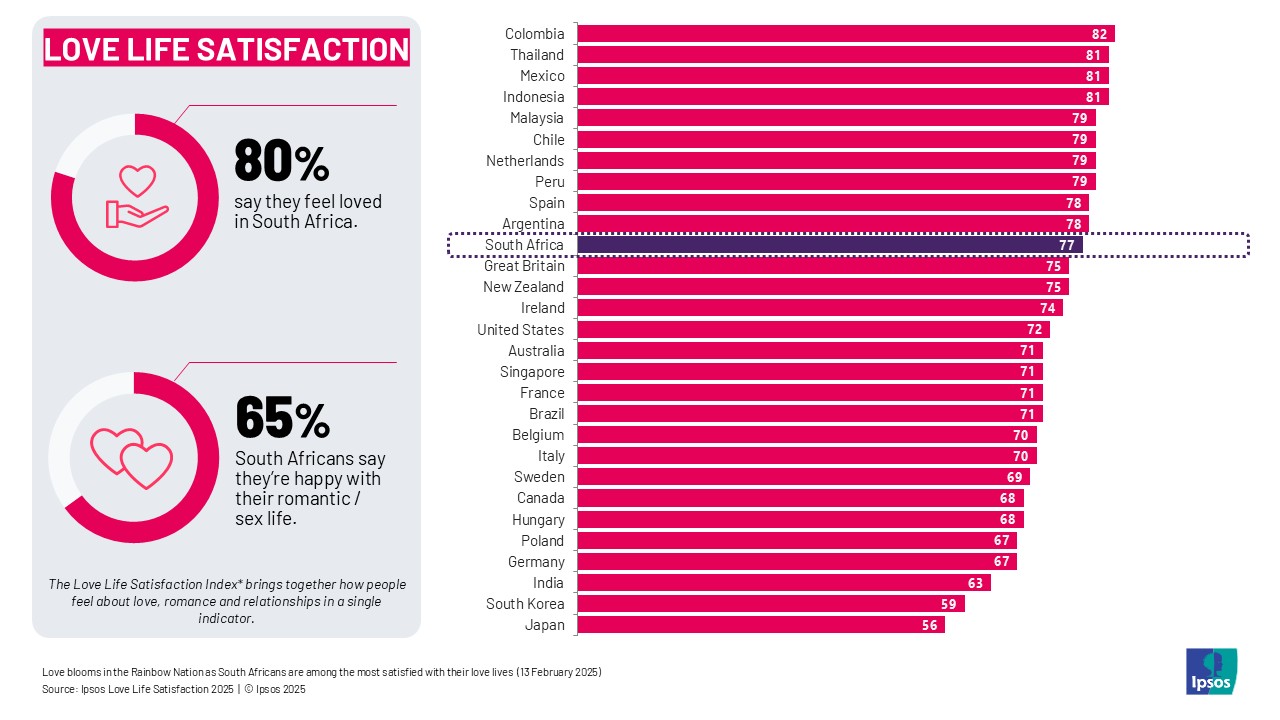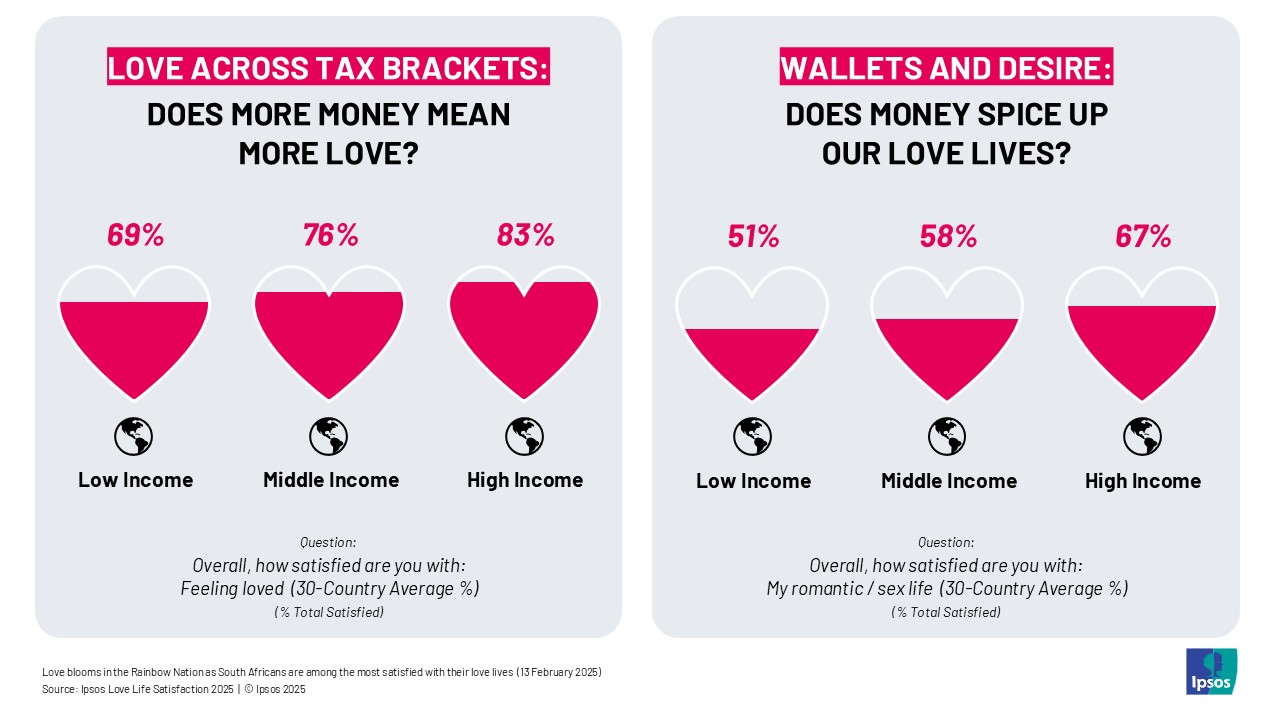Love blooms in the Rainbow Nation as South Africans are among the most satisfied with their love lives
The heart of the matter - Breaking down South Africa's love life satisfaction:
- Love is in the air: South Africa sees an upward trend in love satisfaction, with 8 in 10 South Africans now reporting feeling satisfied with the love in their lives (80%), up from 78% last year and surpassing the global average of 77%. This positive shift reflects a broader global trend, with 23 out of 30 countries surveyed showing an increase in love satisfaction over the past 12 months.
- Romantic and sexual satisfaction in decline: 65% of South Africans are satisfied with their romantic/sex lives, higher than the global average of 59%. In 21 of the 30 countries surveyed the proportion of people happy with their romantic or sex lives has declined in the last 12 months.
- Partners show high relationship satisfaction: Among married or partnered South Africans, close to 9 in 10 are satisfied with their relationship (87%), compared to the global average of 82%. This is highest in Thailand and the Netherlands (both 92%).
- Overall Love Life Satisfaction: South Africa ranks 11th globally on the Love Life Satisfaction Index with a score of 77 out of 100, outperforming many countries.
Robyn Williams, Service Line Manager at Ipsos in South Africa, comments on the findings: "This Valentine's Day, South Africa has a lot to celebrate. Our nation's heart beats strong with love and affection, as online South Africans consistently report high levels of satisfaction in their romantic lives. While many countries are facing a love drought, South Africa blooms as a garden of romantic contentment, nurturing and cherishing its relationships. These findings suggest that Cupid's arrow has found its mark in the Rainbow Nation, making South Africa a beacon of romantic contentment in the global landscape."
Love around the world
- Latin American countries, particularly Colombia, lead in love life satisfaction.
- There's a strong correlation between income and love life satisfaction globally.
- Generational differences in love life satisfaction are minimal on country averages.

"While South Africa performs well in this global comparison, it's important to note the nuances within our society," Williams adds. "Factors like income differences where our study reveals that on country averages, higher income is linked to greater love life satisfaction. In South Africa, where income inequality remains a significant challenge, this could mean varied experiences of love and contentment across different socio-economic groups. As we celebrate our nation's romantic success, we must also consider how to spread the joy of love more evenly across all segments of our society."

South Africa outshines many nations in love and relationship satisfaction
Feeling Loved:
South Africa's 80% satisfaction rate with feeling loved places it significantly above many developed nations. For instance, the United States (76%), Canada (73%), and Germany (72%) all report lower levels of satisfaction in this area, with Japan the least satisfied (56%).
Romantic and Sex Life:
At 65% satisfaction, South Africans are more content with their romantic and sex lives than citizens of many European countries, including France (56%), Germany (48%), and Sweden (48%). The leading nation for satisfaction is Colombia (73%), and Japan again facing a love drought with only 39% reporting satisfaction, suggesting the ‘Land of the Rising Sun’ might need some help rekindling its romantic flame.
Williams notes, "This level of satisfaction in romantic and sexual relationships could be indicative of a culture that values open communication and emotional expression in partnerships."
Partner Relationships:
The 87% satisfaction rate among married or partnered South Africans is particularly notable. This figure puts South Africa on par with countries like the Netherlands (92%) and Great Britain (87%), known for their progressive attitudes towards relationships.
Looking ahead to a future filled with love
As South Africa continues to navigate social and economic challenges, the positive findings from this study offer a bright spot. Williams concludes, "While we celebrate these positive results, they also present an opportunity. How can we leverage this high level of relationship satisfaction to address other social issues? Can strong personal relationships contribute to greater social cohesion and economic productivity?"
About the study
These are the results of a 30-country survey conducted by Ipsos on its Global Advisor online platform and, in India, on its IndiaBus platform, between Friday, December 20, 2024, and Friday, January 3, 2025. For this survey, Ipsos interviewed a total of 23,765 adults aged 18 years and older in India, 18-74 in Canada, Republic of Ireland, Malaysia, New Zealand, South Africa, Türkiye, and the United States, 20-74 in Thailand, 21-74 in Indonesia and Singapore, and 16-74 in all other countries. The sample consists of approximately 2,000 individuals in Japan, 1,000 individuals each in Australia, Brazil, Canada, France, Germany, Great Britain, Italy, Mexico, New Zealand, Spain, and the U.S., and 500 individuals each in Argentina, Belgium, Chile, Colombia, Hungary, Indonesia, Ireland, Malaysia, the Netherlands, Peru, Poland, Singapore, South Africa, South Korea, Sweden, Thailand, and Türkiye. The sample in India consists of approximately 2,200 individuals, of whom approximately 1,800 were interviewed face-to-face and 400 were interviewed online. Samples in Argentina, Australia, Belgium, Canada, France, Germany, Great Britain, Hungary, Italy, Japan, the Netherlands, New Zealand, Poland, South Korea, Spain, Sweden, and the U.S. can be considered representative of their general adult populations under the age of 75. Samples in Brazil, Chile, Colombia, Indonesia, Ireland, Malaysia, Mexico, Peru, Singapore, South Africa, Thailand, and Türkiye are more urban, more educated, and/or more affluent than the general population. The survey results for these countries should be viewed as reflecting the views of the more “connected” segment of their population. India’s sample represents a large subset of its urban population — social economic classes A, B and C in metros and tier 1-3 town classes across all four zones. The data is weighted so that the composition of each country’s sample best reflects the demographic profile of the adult population according to the most recent census data. “The Global Country Average” reflects the average result for all the countries and markets in which the survey was conducted. It has not been adjusted to the population size of each country or market and is not intended to suggest a total result. When percentages do not sum up to 100 or the ‘difference’ appears to be +/-1 percentage point more/less than the actual result, this may be due to rounding, multiple responses, or the exclusion of “don't know” or not stated responses. The precision of Ipsos online polls is calculated using a credibility interval with a poll where N=1,000 being accurate to +/- 3.5 percentage points and of where N=500 being accurate to +/- 5.0 percentage points. For more information on Ipsos' use of credibility intervals, please visit the Ipsos website. The publication of these findings abides by local rules and regulations.

